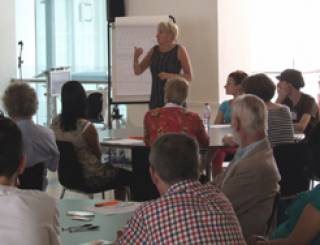
Introduction
Diana Mercer
The UCL Library Services Strategy 2011-2014, having been approved by UCL Library Committee in May, was officially launched at the Library Staff Conference in early August. The Staff Conference was chosen as the forum for this event to acknowledge the contribution made by colleagues to the development of the Strategy, to update them on Implementation Plans, and to invite feedback on progress to date.
The development of the new strategy had begun over a year before with a detailed review, in collaboration with RAND Europe, of our strategic planning process. Comparison of the previous strategy with those of similar institutions in the UK and beyond was a vital first step in developing a strategy fit for the 21st century. Key recommendations included the need to build on existing strengths, for example by gaining a more detailed understanding of external trends and developments in order to set the new strategy in a global context, and for much greater engagement with staff from across Library Services.
As indicated in the Director's Foreword, the new strategy is anchored in the UCL Council White Paper 2011-2021, with its emphasis on transforming student education, enhancing research, and the importance of making a major contribution to society. It is also closely aligned with other major developments at UCL, in particular: the 2011 UCL Research Strategy, with its increasing focus on cross-disciplinarity; and the Bloomsbury Masterplan, as part of which Special Collections will be rehoused alongside the consolidated Main and Science Libraries on the main Bloomsbury campus.
As a first step towards increasing staff involvement, the Library's Planning Team was expanded to include representatives from all Library Groups and its remit extended to include responsibility for developing as well as for implementing the strategy. All members of Library staff were given the opportunity, once a broad outline had been put together, to comment and make suggestions for further improvement.
Around 200 colleagues attended a series of roadshows in October 2010. A particularly helpful outcome was that the Mission, Vision and Values statements were condensed and clarified. In addition, the Library environment emerged as such a high priority that Space Management became a Key Performance Area in its own right. The full list of KPAs is now:
- Student Experience
- Research Support
- Support for Healthcare
- Space Management
- Widening Participation and Public Engagement
Planning Team also drew up a new framework for the delivery of the Strategy. Each of the five KPAs has a detailed Implementation Plan, with information about success criteria, performance measures, responsibilities, stakeholders and timescales. KPA Leaders are to report progress against these Plans at the termly meetings of Planning Team, which in turn makes reports to meetings of UCL Library Committee. Planning Team has also commissioned a new Working Group to look at all the management information, both hard statistics and survey data, that is required for monitoring the delivery of the Strategy, and to ensure that it can be collected in a timely and efficient way.
Planning Team would like to take this opportunity to record its thanks to all those who have contributed to our success drawing up and implementing the new Strategy.

"I thought that this year's conference was really professional and relevant to what library staff do. One of the things I said to a colleague was that I hope we get updates on progress with the Library Strategy at subsequent conferences and I wasn't surprised that the majority of people in the room put their hands up in favour of this at the end. It was also a pleasant surprise to have the Director's speech interspersed with short webcasts illuminating the events and issues in different parts of Library Services that many staff would not otherwise have been aware of. What I think would be useful at future conferences is to have some things such as quizzes involving team work but which could also involve some other kind of problem solving or brainstorming in groups. This kind of thing would promote teambuilding and working together among the staff and could be demanding but could also be fun."
 Close
Close

